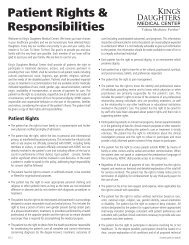Patient Information Guide - King's Daughters' Medical Center
Patient Information Guide - King's Daughters' Medical Center
Patient Information Guide - King's Daughters' Medical Center
You also want an ePaper? Increase the reach of your titles
YUMPU automatically turns print PDFs into web optimized ePapers that Google loves.
<strong>Patient</strong> Rights and<br />
Responsibilities<br />
King’s Daughters <strong>Medical</strong> <strong>Center</strong> shall provide all patients the right to<br />
participate in treatment decisions, actions, and concerns pertinent in<br />
providing their care. KDMC shall be sensitive to all patient needs<br />
including cultural, psychosocial, racial, linguistic, age, gender,<br />
religious, spiritual, and the needs of the disabled patient. <strong>Patient</strong>s shall<br />
be provided impartial access to treatment or accommodations that are<br />
available and/or medically indicated regardless of race, creed, gender,<br />
age, sexual orientation, national origin, availability of transportation, or<br />
sources of payment for care. The patient has the right to considerate,<br />
respectful care at all times and under all circumstances, with recognition<br />
of his or her personal dignity. KDMC expects responsible and<br />
cooperative behavior on the part of patients, families and visitors,<br />
considering the nature of the patient’s illness. The patient shall be<br />
given a copy of their rights and responsibilities.<br />
<strong>Patient</strong> Rights<br />
• The patient has the right to have family or a representative and his/her<br />
own physician notified promptly of admission.<br />
• The patient has the right, within the law, to personal and informational<br />
privacy, as manifested by personal privacy. This includes the refusal to<br />
talk with or see anyone not officially connected with KDMC, including<br />
family members or visitors, or persons officially connected with KDMC<br />
but not directly involved in the patient’s care (not including officers<br />
of the law or courts in performance of their duties). Upon patient<br />
consent, families and/or significant others shall be involved in care<br />
decisions. In the event a patient is unable to speak to this policy,<br />
addressing legal responsibility for consent shall be followed.<br />
• The patient has the right to consent, or withhold consent, to be<br />
recorded or filmed for organizational purposes.<br />
• The patient has the right to wear appropriate personal clothing and<br />
religious or other symbolic items as long as the items are not<br />
considered offensive or obscene and do not interfere with diagnostic<br />
procedures or treatment.<br />
• The patient has the right to be interviewed and examined in surroundings<br />
designed to assure reasonable visual and verbal privacy. This includes<br />
the right to have a person of one’s own gender present during<br />
certain parts of a physical examination, treatment, or procedure<br />
performed by a health professional of the opposite gender and<br />
the right not to remain disrobed any longer than is required for<br />
accomplishing the medical purpose.<br />
• The patient has the right to obtain from the health practitioner<br />
responsible for coordinating the patient’s care all complete and<br />
current information concerning diagnosis (to the degree known),<br />
treatment, outcomes of care (including unanticipated outcomes),<br />
and prognosis. This information should be communicated in terms<br />
the patient can reasonably be expected to understand. When it is<br />
not medically advisable to give such information to the patient, the<br />
information should be made available to next of kin or to a legally<br />
authorized individual.<br />
• Each patient has the right to personal dignity, in an environment<br />
which preserves dignity.<br />
• Each patient has a right to have his or her cultural, psychosocial,<br />
spiritual, and personal values, beliefs, and preferences respected.<br />
• The patient has the right to pain management.<br />
• The patient has the right to know the identity and professional status<br />
of individuals providing service and to know which physician or other<br />
practitioners are primarily responsible for the patient’s care. This<br />
includes the patient’s rights to know of the existence of any<br />
professional relationship among individuals who are providing<br />
treatment, as well as the relationship to any other healthcare or<br />
educational institutions involved in the patient’s care. The patient<br />
has the right to be cared for by staff who have been educated about<br />
patient rights and their role in supporting patient rights.<br />
• Participation by patients in clinical trial programs, human<br />
experimentation or in the gathering of data for clinical research<br />
purposes or other research/educational projects affecting the<br />
patient’s care or treatment is strictly voluntary. The patient has the<br />
right to information about the clinical investigation process and the<br />
right to refuse to participate and must provide a fully informed patient<br />
consent if they choose to participate.<br />
• The patient has the right to access people outside KDMC by means<br />
of family or other visitors and by verbal and written communication.<br />
When the patient does not speak or understand the predominant<br />
language of the community, KDMC shall provide access to an<br />
interpreter.<br />
• Regardless of the source of payment of care, the patient has the right<br />
to request and receive an itemized and detailed explanation of the<br />
total bill for services rendered. The patient has the right to timely<br />
notice prior to termination of eligibility for reimbursement by any<br />
third-party payor for the cost of care.<br />
• The patient at his or her own request (and expense, when applicable)<br />
has the right to consult with specialists.<br />
• The patient has the right to visitors without restriction based on race,<br />
color, national origin, religion, sex, gender identity, sexual orientation<br />
or disability. The patient has the right to accept or deny visitation.<br />
All visitors designated by the patient (or support person where<br />
appropriate) shall enjoy visitation privileges consistent with patient<br />
preferences and consistent with justified clinical restrictions necessary<br />
to provide safe care to patient and other patients.<br />
• The patient has the right to participate in decisions involving his or her<br />
healthcare. To the degree possible, participation should be based on<br />
a clear, concise explanation of all conditions and of all proposed<br />
technical procedures, including the risk of mortality or serious side<br />
effects; problems related to recuperation; medically significant<br />
alternatives for care or treatment; and, the probability of success.<br />
The patient shall not be subjected to any procedure without voluntary,<br />
competent, and understanding consent or the consent of a legally<br />
authorized representative. The patient has the right to know who is<br />
responsible for authorizing and performing the procedures or<br />
treatment.<br />
5





